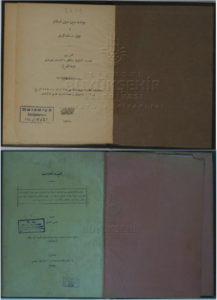Jilian Ma, M.A. (Koç Üniversitesi)
Ottoman/Turkish-China intellectual engagements from the late nineteenth century to the early twentieth century

Two Ottoman works about Islam in China: Kolcalı Abdülaziz, Çin’de Din-i Mübin-i İslam ve Çin Müslümanları, İstanbul: 1321(1903/1904); Hasan Tahsin, Çin’de İslamiyet , İstanbul: Tercüman-ı Hakikat Matbaası, 1322(1904/1905).
Focusing on the flow of knowledge and people in a global context, this project attempts to trace the Ottoman/Turkish-Chinese connections and mutual perceptions from the late nineteenth century to the early twentieth century, when both societies were trying to relocate themselves on the global stage. It explores how these two distant societies imagined, perceived and narrated each other at the discourse level concerning geographic consciousness and current affairs; how they interacted on the practical level via official and unofficial channels such as foreign policy, official missions, and different kinds of travels; how these interactions shaped their knowledge of each other (knowledge itself and forms of knowledge); what contexts promoted the circulation of knowledge between the two societies; and how this knowledge from or about the opposite side was organized and was included in the multi-dimensional ideologies of the local societies and led to further contact. By shifting the perspective from the Western mental effects of “the sick man of Europe” and “the sick man of Asia” to these two entities’ reference of each other, this study aims to disclose mutually intellectual influence of non-Western countries – both its possibilities and constraints, and endeavors to shed light on the internal transition journeys of these two societies individually and their reciprocal creation of an dialogical network of multidirectional interactions.
